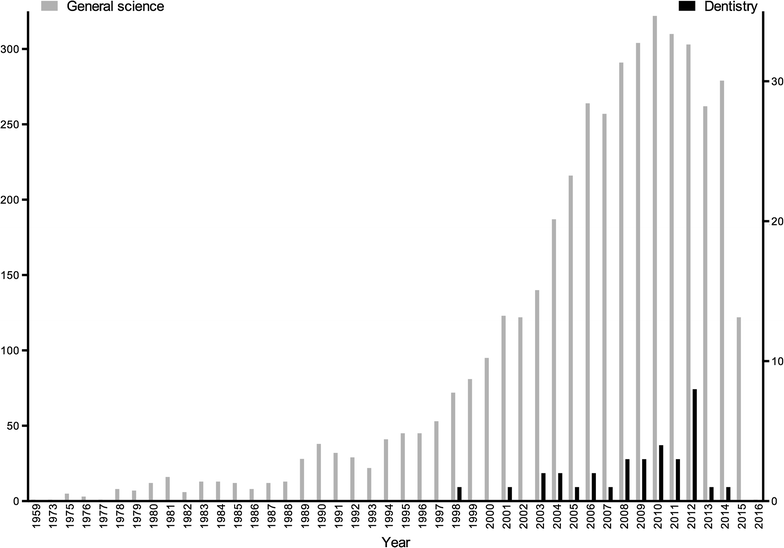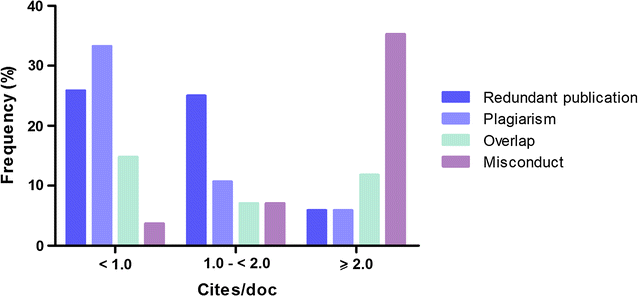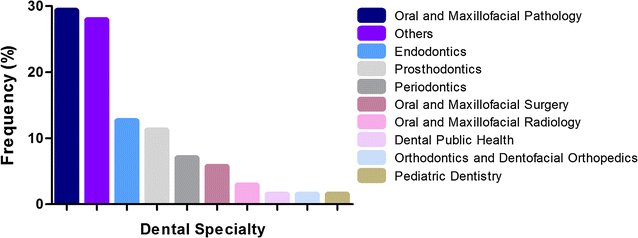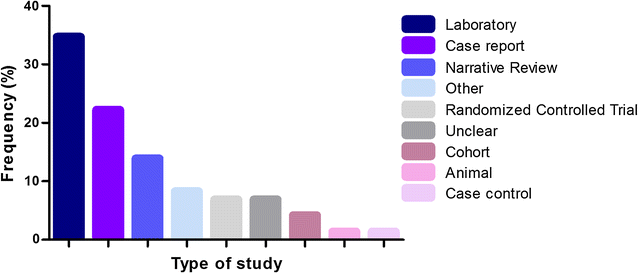A survey of retracted articles in dentistry
- PMID: 28683764
- PMCID: PMC5500970
- DOI: 10.1186/s13104-017-2576-y
A survey of retracted articles in dentistry
Abstract
Background: Publication retraction is a mechanism to preserve the scientific literature against publications that contain seriously flawed or erroneous data, redundant publication, plagiarism, unethical research, and other features that compromise the integrity of science. An increase in the occurrence of retractions in recent years has been reported. Nevertheless, there is scarce information on this topic concerning publications in dentistry and related specialties. Thus, this study aimed to investigate retracted papers published in dental journals.
Methods: Data collection included an exploratory search in PubMed and a specific search in SCImago Journal Rank indexed journals, complemented by the cases reported on the Retraction Watch website and in PubMed. All 167 dental journals included in SCImago were searched for identification of retracted articles up to March 2016. The selected retracted articles and their corresponding retraction notices were recorded and assessed for classification according to the reason for retraction and other additional information.
Results: Forty of the 167 journals scrutinised at SCImago (23.9%) had at least one retracted article, and four additional journals were identified from the Retraction Watch website. A total of 72 retracted found were retracted for the reasons: redundant publication (20.8%), plagiarism (18.1%), misconduct (13.8%), overlap (13.6%) and honest error (9.7%). Higher number of retractions were reported in those journals with cites/doc <2.0-n = 49 (74.2%). The types of studies were mainly laboratory studies (34.7%), case reports (22.2%) and review articles (13.9%).
Conclusions: The approach to ethical problems in papers published in dental scientific journals is still incipient; retractions were mostly due to the authors' malpractice and were more frequently related to journals with less impact.
Keywords: Bioethics; Dentistry; Duplicate publication; Ethics; Plagiarism; Retracted articles; Retracted publication; Retraction of publication; Scientific frauds; Scientific misconduct.
Figures




Similar articles
-
Retracted Publications Within Radiology Journals.AJR Am J Roentgenol. 2016 Feb;206(2):231-5. doi: 10.2214/AJR.15.15163. AJR Am J Roentgenol. 2016. PMID: 26797347
-
Research misconduct in health and life sciences research: A systematic review of retracted literature from Brazilian institutions.PLoS One. 2019 Apr 15;14(4):e0214272. doi: 10.1371/journal.pone.0214272. eCollection 2019. PLoS One. 2019. PMID: 30986211 Free PMC article.
-
Retracted articles in surgery journals. What are surgeons doing wrong?Surgery. 2018 Jun;163(6):1201-1206. doi: 10.1016/j.surg.2018.01.015. Epub 2018 Mar 8. Surgery. 2018. PMID: 29525734
-
An analysis of retractions of dental publications.J Dent. 2018 Dec;79:19-23. doi: 10.1016/j.jdent.2018.09.002. Epub 2018 Sep 8. J Dent. 2018. PMID: 30205129
-
Evaluation of retracted publications in Dentistry: A systematic review.Indian J Med Ethics. 2022 Jul-Sep;VII(3):212-218. doi: 10.20529/IJME.2022.021. Epub 2022 Mar 15. Indian J Med Ethics. 2022. PMID: 35699283
Cited by
-
Comprehensive Analysis of Retracted Publications in Dentistry: A 23-Year Review.Int J Dent. 2020 Dec 27;2020:8881352. doi: 10.1155/2020/8881352. eCollection 2020. Int J Dent. 2020. PMID: 33424973 Free PMC article.
-
Retracted publications in pharmacy systematic reviews.J Med Libr Assoc. 2022 Jan 1;110(1):47-55. doi: 10.5195/jmla.2022.1280. J Med Libr Assoc. 2022. PMID: 35210962 Free PMC article.
-
Data regarding articles retracted from PubMed indexed dental journals from India.Data Brief. 2018 Apr 1;18:1069-1072. doi: 10.1016/j.dib.2018.03.133. eCollection 2018 Jun. Data Brief. 2018. PMID: 29900276 Free PMC article.
-
Retracted articles in the biomedical literature from Indian authors.Scientometrics. 2021;126(5):3965-3981. doi: 10.1007/s11192-021-03895-1. Epub 2021 Mar 7. Scientometrics. 2021. PMID: 33716353 Free PMC article.
-
Retracted publications and their citation in dental literature: A systematic review.Clin Exp Dent Res. 2020 Aug;6(4):383-390. doi: 10.1002/cre2.292. Epub 2020 Mar 31. Clin Exp Dent Res. 2020. PMID: 32233020 Free PMC article.
References
-
- US National Library of Medicine. Fact sheet—errata, retractions, partial retractions, corrected and republished articles, duplicate publications, comments (including author replies), updates, patient summaries, and republished (reprinted) articles policy for Medline [Internet]. Bethesda: US National Library of Medicine; 2015. https://www.nlm.nih.gov/pubs/factsheets/errata.html. Accessed 14 Jun 2016.
-
- Committee on Publication Ethics (COPE). Retraction guidelines [Internet]. COPE; 2009. http://publicationethics.org/files/retraction%20guidelines.pdf. Accessed 14 Jun 2016.
MeSH terms
LinkOut - more resources
Full Text Sources
Other Literature Sources

